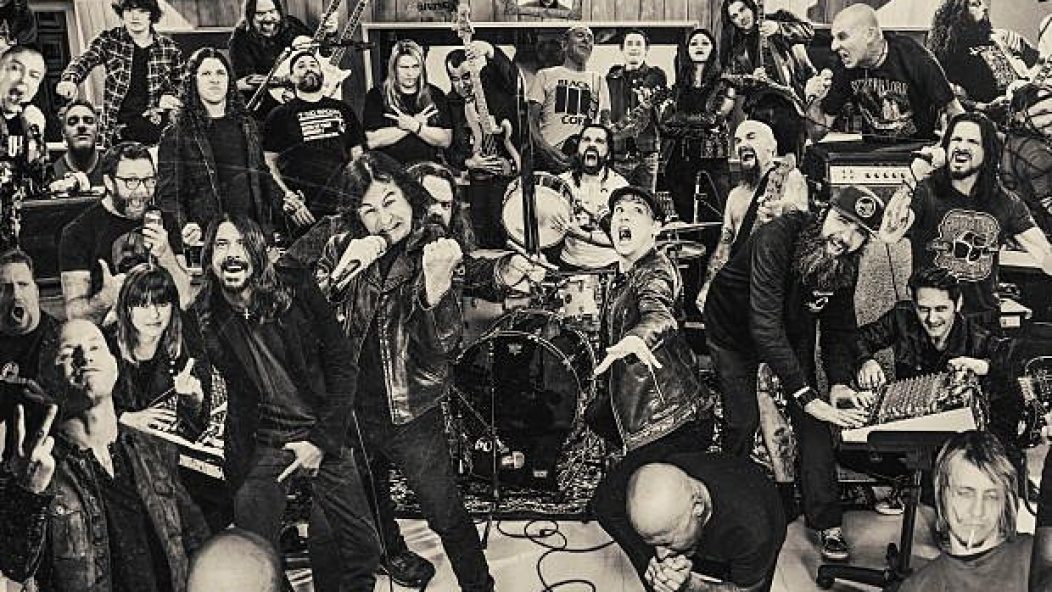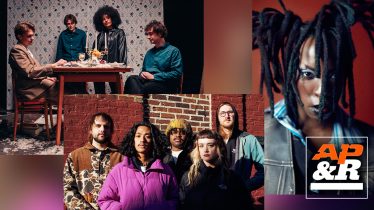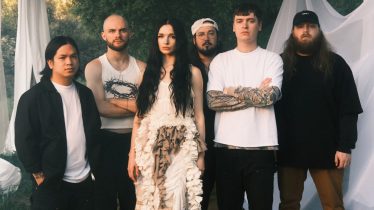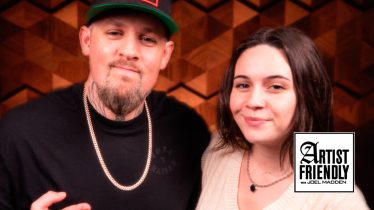
Teenage Time Killers unite eras of hardcore past and present
Since Rolling Stone founder Jann Wenner called Cream a “supergroup,” the tag’s been applied to any pairing of established musicians forming a new band. The idea’s been around for decades, but rarely translates into recorded music that eclipses the members’ prior work. If you look at it from the inside out, such teamings are mostly just a bunch of likeminded musicians trying to have fun.
You can approach Teenage Time Killers however you like, but the hardcore punk supergroup, comprised of a deep cast of luminaries, contemporaries and players who galvanized the United States’ version of the blues on speed, are just playing songs—that’s it. No, it’s not in a garage or suburban basement. Their debut album Teenage Time Killers: Greatest Hits Vol. 1 was recorded at Dave Grohl’s Studio 606, but Corrosion of Conformity drummer Reed Mullin and cohorts (which include members of Alkaline Trio, Bad Religion, Slipknot, Fear, Dead Kennedys and a ton more) assembled a collection of tracks that do something different than most all-star pairings: They capture the past, present and future of punk rock.
Rather than focusing on one style, sound, or sentiment, Mullin and My Ruin guitarist Mick Murphy paid homage to hardcore punk, tapping into every possible influence that gets them fired up or even tuned down. Like a dubbed cassette labeled “punk mix” that languished on the floorboards of so many cheap domestic cars in the ‘80s, the Teenage Time Killers’ debut album darts, screams, drones and blazes in all directions, but remains punk. Not metal, not alternative, not thrash or industrial, but all of those things, because… why not?
Yes, Dave Grohl is involved, along with a roster so deep it would be exhausting to even start to list them, but chances are someone you have an affinity for contributed to Teenage Time Killers: Greatest Hits Vol. 1. One such person is Lamb Of God vocalist Randy Blythe. After running into Mullin at an airport and learning about the project, he soon found himself in the fold. “I was super-excited when Reed hit me up and asked if I wanted to sing on the album,” Blythe says. “C.O.C.’s Animosity was a huge influence on me growing up, and to be in the studio with him and [C.O.C. bassist] Mike Dean present, working on a punk-rock album, was something I would have never foreseen happening back in my high school days. Nothing against the younger generation of musicians coming up today, but recording with dudes who helped build the underground that has sustained me throughout the years and shaped so much of who I am as a person was far more monumental for me than recording with any current group out today ever could be. It was a blast, and I was honored in the truest sense of the word to be asked to do so!”
Anthony Pappalardo spoke with drummer Reed Mullin, founding member of C.O.C. and T.T.K., about his salad days and what it’s like to put together an album—with such a diverse and magnanimous cast of musicians—all in the name of punk rock.

There are so many styles of hardcore on the album; it’s a true snapshot of punk’s lineage. Who were the bands that initially informed you?
REED MULLIN: Yeah, y'know I think it is, particularly the super-early '80 East Coast hardcore scene. Me and my buddies grew up in Raleigh, North Carolina, which is kind of close to Washington, D.C., so we were all heavily influenced by the whole Dischord scene.
Being a punk in Raleigh back in '81 was a challenge, though. Not only were cops constantly hassling you and rednecks trying to kill you, but you had to drive to Richmond or D.C. to get any good fucking records. As D. Boon from the Minutemen said, “Punk rock changed my life,” and that was certainly true with me. It was an obsession verging on a religion for me. It got to the point where we would order boxes of 7-inches from Ian MacKaye and the Dischord folks, and sell 'em to our unconverted high school classmates. I think they were $2.50 with a money-back guarantee.
I was super-lucky that my folks were super-supportive of Corrosion Of Conformity; they bought our first van and let me book our early tours out of their office. Also, my dad had Xerox machine that he let me use, so it wasn't too long before I was booking all the shows in town. Raleigh's in between D.C. and Atlanta, so we were a great stopping place for tons of touring hardcore and punk bands. I booked everybody back then: Black Flag, Suicidal Tendencies, D.O.A., Void, Dead Kennedys, Scream, Negative Approach, Toxic Reasons, Bl'ast, Marginal Man, Battalion Of Saints, etc. And everyone loved me cause I gave all the bands 100 percent of the money after the $150 club rental. Flyers were always free. Got to meet zillions of people from all over the country and went from there.
As much as the Timekillers album is a real introduction to hardcore punk, what would you recommend to the uninitiated, for a “punk-rock starter kit?”
I reckon a good healthy starter kit of the bands that got me and my buddies all super-stoked would include Bad Brains, Black Flag, Void, Minor Threat, Discharge, Articles Of Faith, Germs, Crass, DOA, Descendents, Rudimentary Peni, Circle Jerks, Dead Kennedys, MDC, Hüsker Dü, Zero Boys, GBH, Minutemen, Honor Role, D.R.I., Toxic Reasons, and the This Is Boston, Not L.A., Flex Your Head and Let Them Eat Jellybeans! compilations.
Why do you think C.O.C.’s mix of metal and hardcore was so successful, compared to others who tried to mix the genres?
Do you think we were successful? I guess we kinda were and we're still around, anyways! That's good, I reckon.
Well, me and the C.O.C. guys all kinda made a musical progression, I guess a lot of folks made [one] back then, at least in terms of the kinds of bands we liked. For us, it was rock bands [such as] Black Sabbath, Jimi Hendrix and Deep Purple to the Stooges, MC5, Ramones and Sex Pistols, then to the L.A. punk bands and later the D.C. hardcore bands. All in pretty short order.
After a while, we got little bored with the standard structure of hardcore tunes and decided to try and add some Sabbath influences, to make them a little more interesting to play. Not a whole hell of a lot of bands were doing it at the time, so we, along with D.R.I. and Suicidal Tendencies, got pegged as being sort of a crossover from hardcore punk to metal or “thrash metal,” I guess. Void and Discharge were doing it way before us though.
Right off the bat however, some metal sounds were oozing in. For instance, on our first album, Eye For An Eye, we have a song called “Rednekkk,” which is really just Black Sabbath’s “Symptom Of The Universe” sped up a hundred times. We also used Sabbath's “Cornucopia” as an intro, and did a cover of Judas Priest's cover of Fleetwood Mac's “Green Manalishi.” A lot of the purists hated what we were doing, but we didn't care. By the mid-’80's we, like a lot of people, thought hardcore was getting generic and stale.
Why was it important to make the songs on the Teenage Time Killers record so varied, rather than making a record that emulated one style or specific sound?
Man, it really wasn't planned. We wanted to write some songs of that time period. But really, the scene was crazy varied back then, too. I remember in '82, when I was 16, I went on a pilgrimage to L.A. to try and see the Minutemen. This was before they had done a national tour and I really wanted to see ‘em. Never did, but that's another story. While I was there, there was a giant show that was supposed to happen, with Black Flag Hüsker Dü, DOA, Minutemen, and I think, Descendents. The show ended up getting cancelled, but think about that lineup. Today, it would be all categorized and divided up: Flag equals metal, Hüsker Dü equals alternative, D.O.A. equals punk. So with the Teenage Time Killers album, we are kinda all over the place, but with a reasonably consistent theme. I think the album exemplifies that time in music—at least how it seemed to me.

“Days Of Degradation” is reminiscent of I Against I-era Bad Brains. Were you trying to channel certain bands and pay homage?
Right? Yeah, I think it does, too! We were originally thinking of trying to get [Brains singer] H.R. actually, but quickly realized that might not be a good idea. Anyways, Tommy Victor from Prong is an old friend of ours from the CBGB days, and knew for a fact he could kill that tune… and he did.
The track “Barrio,” which features Matt Skiba and Brian Baker, is a very anthemic song, almost in the style of Naked Raygun. Were you writing songs with specific players in mind or did you seek out the right fit for each song?
You know, I think “Barrio” is one of the best songs on the record. I love that song. Unfortunately, I didn't write it: My man Jonny [Webber] from a local Raleigh band called the Ghost Of Saturday Nite showed it to me, and I thought it would add some balance to the album. Jonny wrote and also sang “Son Of An Immigrant.”
As soon as we put that track down, I knew I wanted to get Brian Baker on there. Thankfully, he said yes. I wasn't there when he put the tracks down for “Barrio” and “Son Of An Immigrant,” but I am told he nailed them both mighty fast. Skiba rules. I was there for that. He had never heard the song until that day, I think. And he knocked that fucker out in, like, three takes. Incredible.
Favorite songs on the album?
Awww… c'mon now. That’s like tryin' to pick my favorite churrins! Seriously, there are so many different kinda styles of punk and hardcore and metallurgical flavors, I bounce back and forth. This week, it's “The Dead Hand” which is a mid-paced Discharge, Hear Nothing, See Nothing, Say Nothing-era sounding tune about the Soviets former system, to launch their entire nuclear arsenal at the U.S., even if they had already been totally wiped out.
The album sounds like a big party and celebration of punk. What was it like putting it all together?
It kind of came together accidentally—more of a piecemeal process and a lot of little parties. It was originally also just supposed to be five songs, one of which was gonna be “Ode To Sean Hannity.” I had seen John Cleese from Monty Python on an episode of Keith Olbermann's old MSNBC show a couple years back, where he happened read his poem “Ode To Sean Hannity” aloud. It was fucking hilarious: The cadence and the biting political comedy sounded just like a song the Dead Kennedys would have written back in the old days. So, when we were getting our original five songs together for what later turned into Greatest Hits Vol. 1, I put Cleese's poem to music, asked Jello to sing it and he said yes. Thank God.
After that first recording session, I was on my way home to Raleigh and had a chance meeting with Randy Blythe from Lamb of God at the Los Angeles International Airport, who, upon being turned on to our project, demanded he be added to the list of guests. Not only is he 8-feet tall, but he needed a little cheering up after being held in some Czech Republic gulag for months on end.
After all that, we got crazy and started asking ourselves. “Wouldn't it be cool if [Articles Of Faith singer] Vic Bondi sang on that?” or “What if Nick Oliveri played bass on those Void songs?” and asking all sorts of folks. Surprisingly, everyone said yeah. We went from five songs with one guest singer to like, two dozen songs with 30-plus musicians and singers.
What's the future hold for Teenage Time Killers?
Well, I would really like to figure out how to get everybody—or as many of us as possible—together and do a show or shows—that would be sick. And obviously, Teenage Time Killers Greatest Hits Vol. 2! alt








